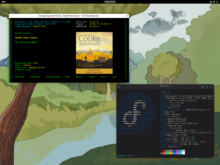Semplice Version 2.11 Released
Today, I released Semplice Version 2.11. It contains the fixes I mentioned were needed last time, namely that the SACD ISO-handling software I had been relying on had suddenly decided to disappear from the Internet and thus needed replacing in its entirety. The fix essentially consists of switching to using sacd as the ISO extractor instead, which is still downloadable -though it doesn't appear to be actively maintained. I've also cloned the sacd repository so that, should that ever suddenly disappear, I'll have my own copy to rely on.
The irony here is that around five years ago, when I first wrote the precursor software to Semplice, I used sacd as the ISO extractor and only switched to odio-sacd when I realised that sacd was a fork of odio-sacd: I wrote an explanatory piece as to why I was, back then, choosing the odio-sacd software over the forked sacd offering. Several years later, the tables have turned, the original has been withdrawn and I'm forced to revert back to using the fork! [...]







